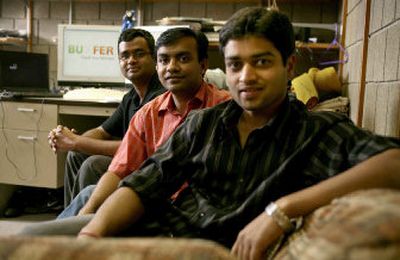No more haggling over bills

PITTSBURGH — Splitting dinner checks can cause a splitting headache, even when the diners are a math-oriented data miner, a database security specialist and an expert in networked games. Fed up with haggling over shared debts, Carnegie Mellon University computer science graduate students Shashank Pandit, Amit Manjhi and Ashwin Bharambe three years ago created Buxfer, short for “bucks transfer.”
The social-networking site with a personal-finance focus allows users to form groups of friends or housemates and track who owes what for utility bills, dinner tabs, day trips and other shared expenses.
Instead of fretting over how every dinner bill should be split, Bharambe, Manjhi and Pandit realized that they could track their collective expenses over longer periods of time. For example, one housemate could pay for dinner and a movie for everyone, earning credits in his Buxfer group and therefore paying less than his roomies on the next month’s utility bills.
Buxfer quickly became popular with its creators’ friends and colleagues, many of them college students or young professionals on tight budgets. In September, Pandit, Manjhi and Bharambe launched a Web site offering Buxfer to the general public at no cost.
Since then, Buxfer has grown to about 3,000 users who have completed transactions worth more than $875,000, said Pandit, 24. Most users are university students, some from as far away as India and Australia, he said. The site allows users to set the default currency to dollars, Euros, pounds, yen or rupees. But it doesn’t offer a conversion feature.
News of the site has spread largely by word of mouth, on blogs and by flyers posted at universities, Pandit said.
Kedar Dhamdhere, 28, a software engineer at Google Inc., said he uses Buxfer almost every day. Previously, he had relied on scraps of paper and memory, which wasn’t very reliable.
“Instead of doing all the calculations, I just enter the information in Buxfer and that’s it,” he said. “You can keep track of all your friends in one place.”
Buxfer automatically e-mails Dhamdhere and other users in his groups about new transactions and payments. And when he logs into Buxfer, icons on the home page show him how much he owes or is owed. He and his friends can also leave notes for each other on the site.
Sites like BillMonk offer broadly similar services, but with different specific features, Pandit said.
Unlike Buxfer, BillMonk also allows users to track belongings, like books and DVDs, lent to friends. In addition, it lets them report expenses via SMS text message. Pandit said he and his friends are working on a similar feature that would allow users enter and receive data from a mobile phone or PDA.
The program begs for additional features, said Michael Shamos, a computer science professor at Carnegie Mellon who also specializes in e-commerce.
“Just keeping track of debts is nice,” he said. “But wouldn’t it be nice if you could also pay them. Right now there isn’t any facility for doing that.”